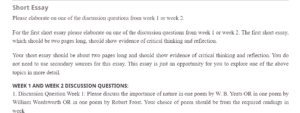Love in Shakespeares Sonnet 18
Please discuss the theme of love in one poem by William Shakespeare OR in one poem by Edgar Allan Poe OR in one poem by E. B. Browning. Your choice of poem should be from the required readings in week 2
When the notion of love comes to mind, numerous authors, playwrights, and even scholars have provided their diverse understanding of love, but with no efficacious and satisfactory portrayal of love, as Shakespeare has, in his literary works. As one of the greatest works of William Shakespeare, sonnet 18; “Shall I compare thee to a summer’s day?” provides a riveting instance where the poet exudes a skillful description of the notion of love. In Sonnet 18, the poet brilliantly describes the nature of beauty and the efficacy of using poetry to delineate the notion of beauty. In this poem, the persona is smitten by the individual being described and praises are heaped on the person being described by the persona. Doubtless, the persona uses several instances of stylistic devices to describe the physical attributes, including similes and metaphors. With this in mind, it suffices to say Sonnet 18 provides a deep definition of the notion of love and affection much better than other works.
Foremost, the poet employs the use of this poem to heap praise on the beauty of his beloved. Clearly, the power of love makes the poet immortalize the persona’s beloved. When the poem begins, the reader is able to tell that the persona is overwhelmed by love. The love-stricken persona begins by asking, “Shall I compare thee to a summer’s day?” (Shakespeare, 1914, p. 18). In this poem, the poet employs metaphors, similes, and imagery to describe the affection for the beloved. When the reader takes time to read the poem, it is evident that the persona asked this question and essentially spent the rest of the poem answering the question and justifying why the beloved is only comparable to a summer’s day. Through sufficient use of figurative language, the poet explains to the readers that the beloved that he describes has eternal beauty, which exceeds the beauty of the summer’s day. By so saying, the poet insists that the beauty that the beloved possesses will last for an eternity.
Similarly, through the use of highly exalting similes, the persona is quick to denounce that inasmuch as the similes are powerful in describing beauty, they fall short of the beauty of the persona’s beloved. For example, at the start of the poem, he likens the beloved to a summer’s day, but he quickly refutes the efficacy of the metaphor in the description, feeling it is inadequate to express the brightness of the beauty that the beloved exudes because the persona goes forth to maintain that being as bright as a summer’s day is less because the beloved is more temperate and more lovely. As the poem progresses, the readers can tell the persona is becoming increasingly perturbed by the fact that when he likens the beloved to everything he had mentioned before, would, in the end, wither and die out. However, the persona wants to make sure the beloved’s beauty is eternal. As such, the persona introduces another ‘summer’ that belongs specifically to the beloved, whereby, in line 9, for instance, the persona maintains that ‘thy eternal summer shall not fade.’ This clearly puts the beloved in a position whereby his beauty would never perish, even though he would die.
Again, when the poet lays his primary focus on extensive usage of imagery to speak of his beloved’s beauty and physical allure. For example, in the description of summer, he describes it in a way that is in sharp contrast to what we summer to be. For instance, when the persona says, “Rough winds do shake the darling buds of May” he tries to explain that the summer winds are a menace to the flowers blooming in spring. Also, by maintaining that seasons do change, the persona is keen to show to the readers, that the beloved’s beauty would be ceaseless and never change.
In conclusion, from the discussion above, it is clear that Shakespeare’s understanding of love is that for his beloved, love would never change. By using the aspect of imagery, similes, and metaphors, the poet has been able to depict love in this sonnet efficaciously.
References
Shakespeare, W. (1914). Sonnet 18.
ORDER A PLAGIARISM-FREE PAPER HERE
We’ll write everything from scratch
Question
Short Essay
Please elaborate on one of the discussion questions from week 1 or week 2.

Love in Shakespeares Sonnet 18
For the first short essay please elaborate on one of the discussion questions from week 1 or week 2. The first short essay, which should be two pages long, should show evidence of critical thinking and reflection.
Your short essay should be about two pages long and should show evidence of critical thinking and reflection. You do not need to use secondary sources for this essay. This essay is just an opportunity for you to explore one of the above topics in more detail.
WEEK 1 AND WEEK 2 DISCUSSION QUESTIONS:
1. Discussion Question Week 1: Please discuss the importance of nature in one poem by W. B. Yeats OR in one poem by William Wordsworth OR in one poem by Robert Frost. Your choice of poem should be from the required readings in week
OR
2. Discussion Question Week 2: Please discuss the theme of love in one poem by William Shakespeare OR in one poem by Edgar Allan Poe OR in one poem by E. B. Browning. Your choice of poem should be from the required readings in week 2
Please use this link for this essay:http://www.online-literature.com/poe/

